Culture and Health: Aboriginal and Torres Strait Islander People
VerifiedAdded on 2020/10/05
|10
|3239
|448
Essay
AI Summary
This essay delves into the intricate relationship between culture and health, focusing on the Aboriginal and Torres Strait Islander populations in Australia. It analyzes cultural factors influencing health outcomes, including poverty, chronic diseases, and the impact of racism and discrimination. The essay explores health issues such as lack of education, unemployment, domestic violence, and substance misuse, using the case of a young Aboriginal male to illustrate these challenges. It utilizes sociological imagination and social determinants of health as theoretical frameworks to understand the connections between individual experiences and societal structures. The essay further examines cultural practices, barriers to healthcare, and resource distribution, advocating for culturally safe care and improved health outcomes for Indigenous Australians. It emphasizes the importance of addressing social justice, traditional healing, and connection to the nation to achieve holistic well-being.
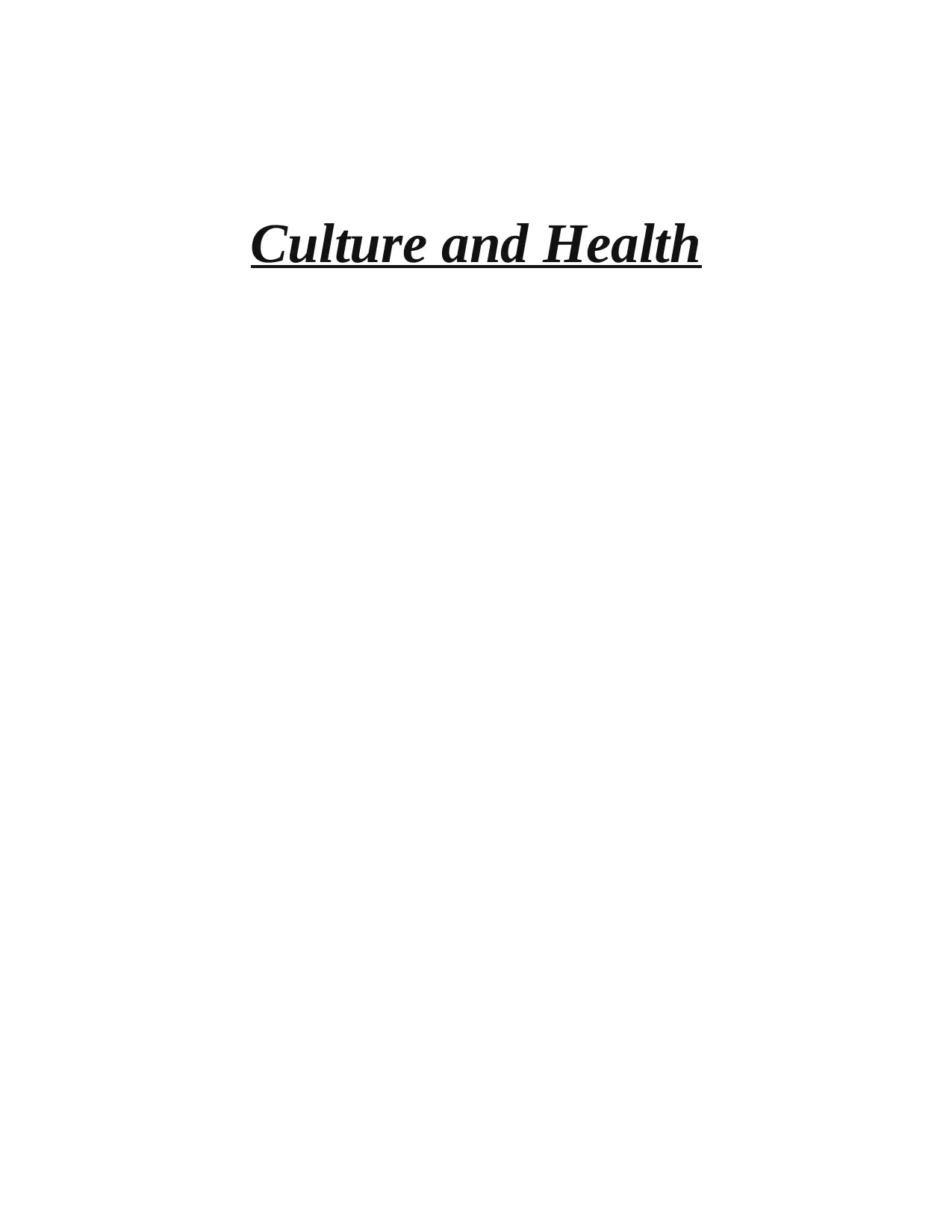
Culture and Health
Paraphrase This Document
Need a fresh take? Get an instant paraphrase of this document with our AI Paraphraser
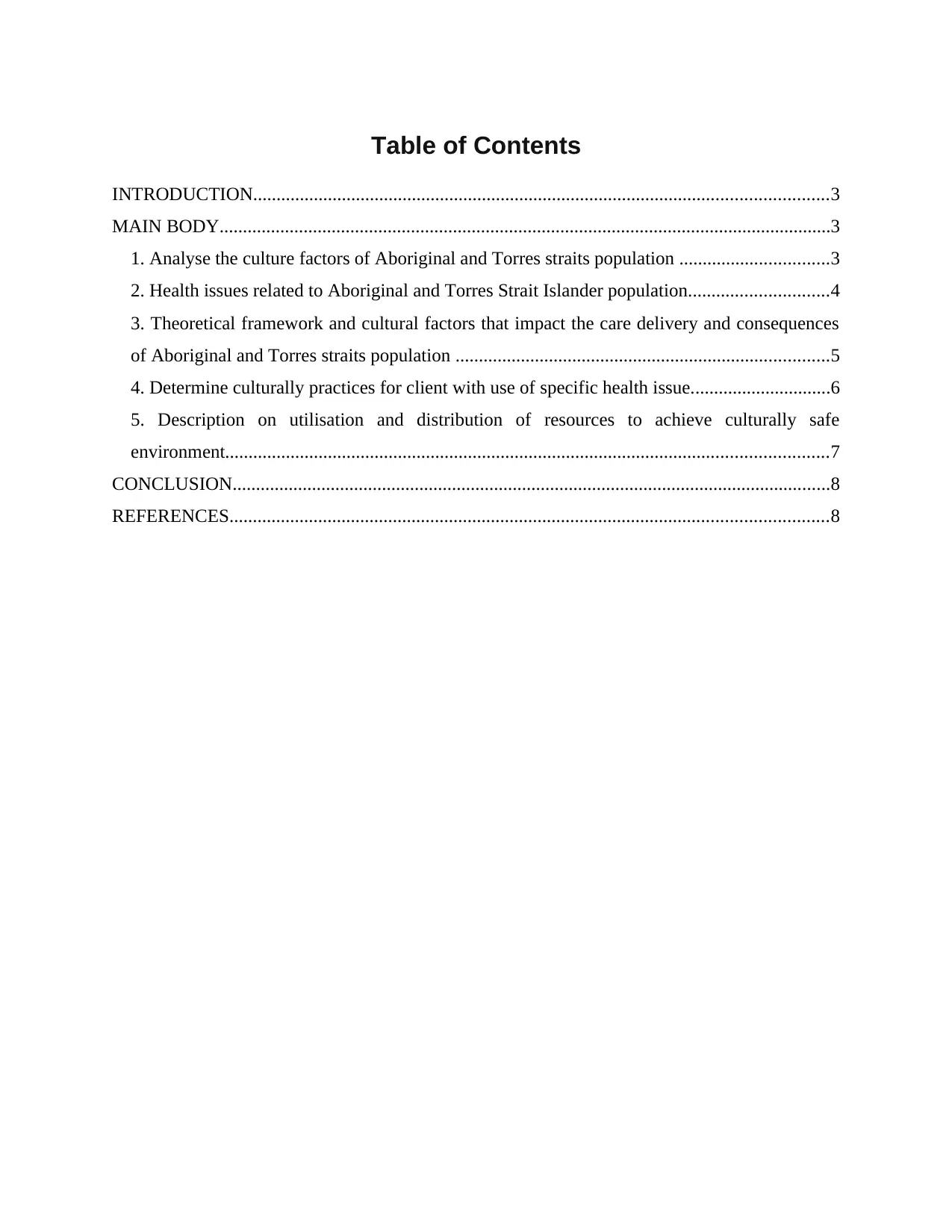
Table of Contents
INTRODUCTION...........................................................................................................................3
MAIN BODY...................................................................................................................................3
1. Analyse the culture factors of Aboriginal and Torres straits population ................................3
2. Health issues related to Aboriginal and Torres Strait Islander population..............................4
3. Theoretical framework and cultural factors that impact the care delivery and consequences
of Aboriginal and Torres straits population ................................................................................5
4. Determine culturally practices for client with use of specific health issue..............................6
5. Description on utilisation and distribution of resources to achieve culturally safe
environment.................................................................................................................................7
CONCLUSION................................................................................................................................8
REFERENCES................................................................................................................................8
INTRODUCTION...........................................................................................................................3
MAIN BODY...................................................................................................................................3
1. Analyse the culture factors of Aboriginal and Torres straits population ................................3
2. Health issues related to Aboriginal and Torres Strait Islander population..............................4
3. Theoretical framework and cultural factors that impact the care delivery and consequences
of Aboriginal and Torres straits population ................................................................................5
4. Determine culturally practices for client with use of specific health issue..............................6
5. Description on utilisation and distribution of resources to achieve culturally safe
environment.................................................................................................................................7
CONCLUSION................................................................................................................................8
REFERENCES................................................................................................................................8
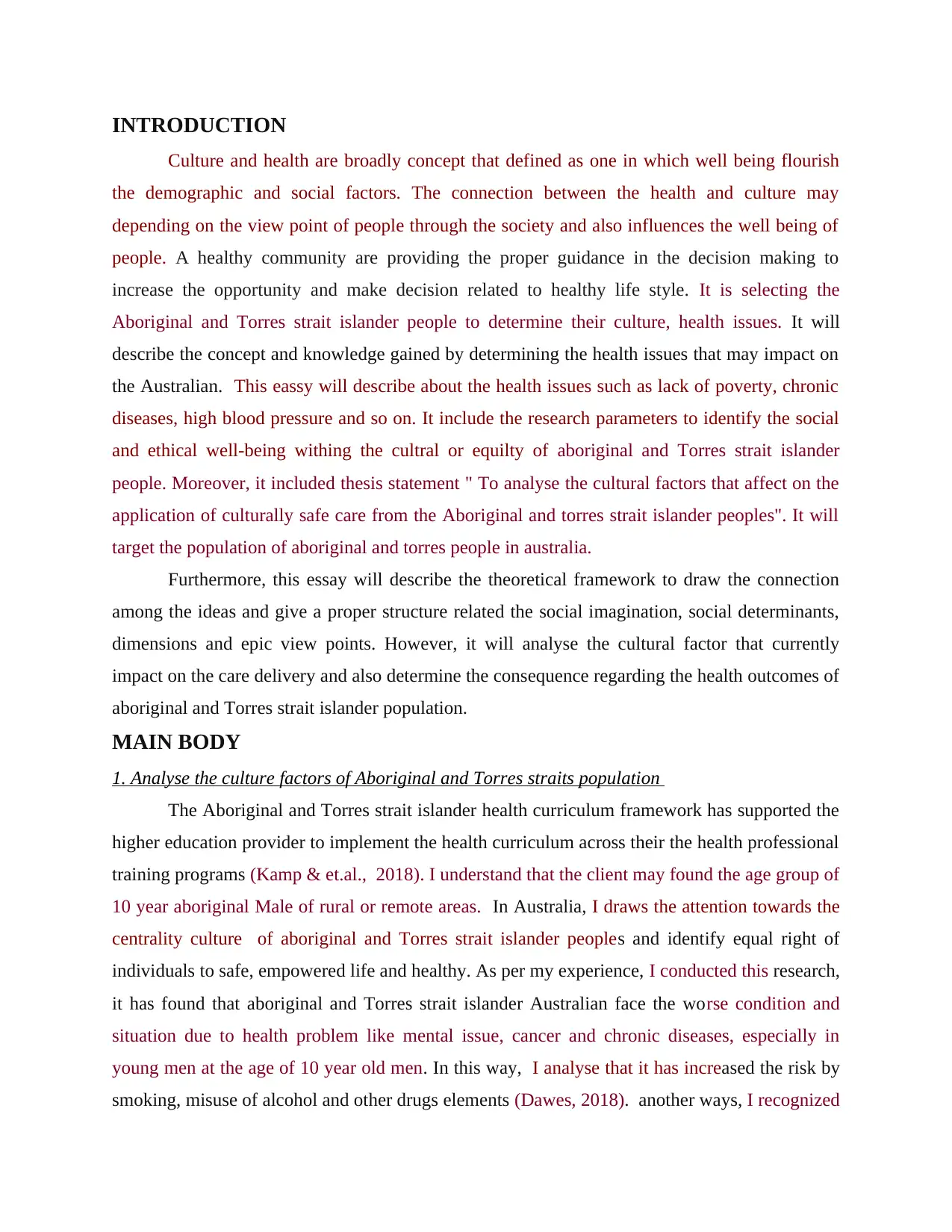
INTRODUCTION
Culture and health are broadly concept that defined as one in which well being flourish
the demographic and social factors. The connection between the health and culture may
depending on the view point of people through the society and also influences the well being of
people. A healthy community are providing the proper guidance in the decision making to
increase the opportunity and make decision related to healthy life style. It is selecting the
Aboriginal and Torres strait islander people to determine their culture, health issues. It will
describe the concept and knowledge gained by determining the health issues that may impact on
the Australian. This eassy will describe about the health issues such as lack of poverty, chronic
diseases, high blood pressure and so on. It include the research parameters to identify the social
and ethical well-being withing the cultral or equilty of aboriginal and Torres strait islander
people. Moreover, it included thesis statement " To analyse the cultural factors that affect on the
application of culturally safe care from the Aboriginal and torres strait islander peoples". It will
target the population of aboriginal and torres people in australia.
Furthermore, this essay will describe the theoretical framework to draw the connection
among the ideas and give a proper structure related the social imagination, social determinants,
dimensions and epic view points. However, it will analyse the cultural factor that currently
impact on the care delivery and also determine the consequence regarding the health outcomes of
aboriginal and Torres strait islander population.
MAIN BODY
1. Analyse the culture factors of Aboriginal and Torres straits population
The Aboriginal and Torres strait islander health curriculum framework has supported the
higher education provider to implement the health curriculum across their the health professional
training programs (Kamp & et.al., 2018). I understand that the client may found the age group of
10 year aboriginal Male of rural or remote areas. In Australia, I draws the attention towards the
centrality culture of aboriginal and Torres strait islander peoples and identify equal right of
individuals to safe, empowered life and healthy. As per my experience, I conducted this research,
it has found that aboriginal and Torres strait islander Australian face the worse condition and
situation due to health problem like mental issue, cancer and chronic diseases, especially in
young men at the age of 10 year old men. In this way, I analyse that it has increased the risk by
smoking, misuse of alcohol and other drugs elements (Dawes, 2018). another ways, I recognized
Culture and health are broadly concept that defined as one in which well being flourish
the demographic and social factors. The connection between the health and culture may
depending on the view point of people through the society and also influences the well being of
people. A healthy community are providing the proper guidance in the decision making to
increase the opportunity and make decision related to healthy life style. It is selecting the
Aboriginal and Torres strait islander people to determine their culture, health issues. It will
describe the concept and knowledge gained by determining the health issues that may impact on
the Australian. This eassy will describe about the health issues such as lack of poverty, chronic
diseases, high blood pressure and so on. It include the research parameters to identify the social
and ethical well-being withing the cultral or equilty of aboriginal and Torres strait islander
people. Moreover, it included thesis statement " To analyse the cultural factors that affect on the
application of culturally safe care from the Aboriginal and torres strait islander peoples". It will
target the population of aboriginal and torres people in australia.
Furthermore, this essay will describe the theoretical framework to draw the connection
among the ideas and give a proper structure related the social imagination, social determinants,
dimensions and epic view points. However, it will analyse the cultural factor that currently
impact on the care delivery and also determine the consequence regarding the health outcomes of
aboriginal and Torres strait islander population.
MAIN BODY
1. Analyse the culture factors of Aboriginal and Torres straits population
The Aboriginal and Torres strait islander health curriculum framework has supported the
higher education provider to implement the health curriculum across their the health professional
training programs (Kamp & et.al., 2018). I understand that the client may found the age group of
10 year aboriginal Male of rural or remote areas. In Australia, I draws the attention towards the
centrality culture of aboriginal and Torres strait islander peoples and identify equal right of
individuals to safe, empowered life and healthy. As per my experience, I conducted this research,
it has found that aboriginal and Torres strait islander Australian face the worse condition and
situation due to health problem like mental issue, cancer and chronic diseases, especially in
young men at the age of 10 year old men. In this way, I analyse that it has increased the risk by
smoking, misuse of alcohol and other drugs elements (Dawes, 2018). another ways, I recognized
⊘ This is a preview!⊘
Do you want full access?
Subscribe today to unlock all pages.

Trusted by 1+ million students worldwide
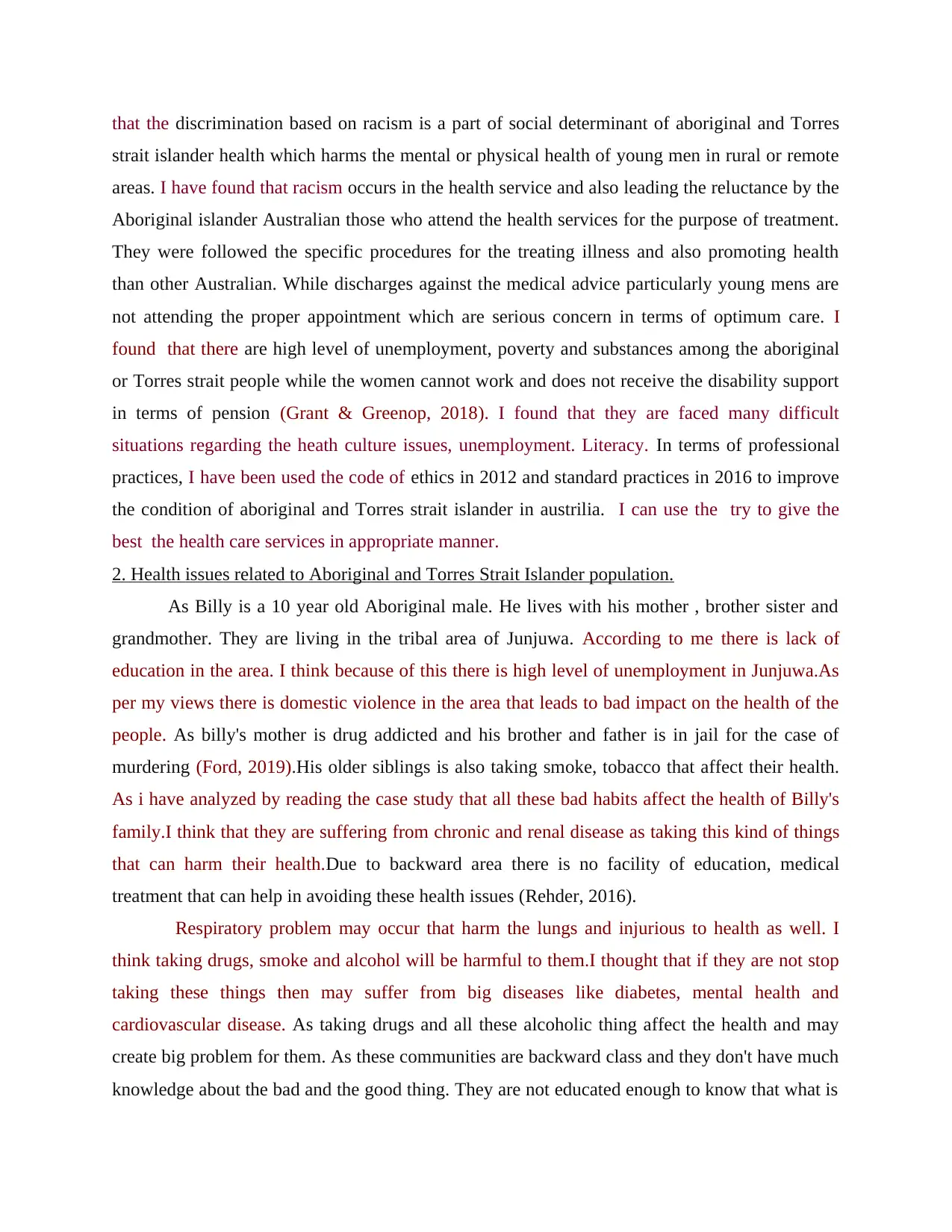
that the discrimination based on racism is a part of social determinant of aboriginal and Torres
strait islander health which harms the mental or physical health of young men in rural or remote
areas. I have found that racism occurs in the health service and also leading the reluctance by the
Aboriginal islander Australian those who attend the health services for the purpose of treatment.
They were followed the specific procedures for the treating illness and also promoting health
than other Australian. While discharges against the medical advice particularly young mens are
not attending the proper appointment which are serious concern in terms of optimum care. I
found that there are high level of unemployment, poverty and substances among the aboriginal
or Torres strait people while the women cannot work and does not receive the disability support
in terms of pension (Grant & Greenop, 2018). I found that they are faced many difficult
situations regarding the heath culture issues, unemployment. Literacy. In terms of professional
practices, I have been used the code of ethics in 2012 and standard practices in 2016 to improve
the condition of aboriginal and Torres strait islander in austrilia. I can use the try to give the
best the health care services in appropriate manner.
2. Health issues related to Aboriginal and Torres Strait Islander population.
As Billy is a 10 year old Aboriginal male. He lives with his mother , brother sister and
grandmother. They are living in the tribal area of Junjuwa. According to me there is lack of
education in the area. I think because of this there is high level of unemployment in Junjuwa.As
per my views there is domestic violence in the area that leads to bad impact on the health of the
people. As billy's mother is drug addicted and his brother and father is in jail for the case of
murdering (Ford, 2019).His older siblings is also taking smoke, tobacco that affect their health.
As i have analyzed by reading the case study that all these bad habits affect the health of Billy's
family.I think that they are suffering from chronic and renal disease as taking this kind of things
that can harm their health.Due to backward area there is no facility of education, medical
treatment that can help in avoiding these health issues (Rehder, 2016).
Respiratory problem may occur that harm the lungs and injurious to health as well. I
think taking drugs, smoke and alcohol will be harmful to them.I thought that if they are not stop
taking these things then may suffer from big diseases like diabetes, mental health and
cardiovascular disease. As taking drugs and all these alcoholic thing affect the health and may
create big problem for them. As these communities are backward class and they don't have much
knowledge about the bad and the good thing. They are not educated enough to know that what is
strait islander health which harms the mental or physical health of young men in rural or remote
areas. I have found that racism occurs in the health service and also leading the reluctance by the
Aboriginal islander Australian those who attend the health services for the purpose of treatment.
They were followed the specific procedures for the treating illness and also promoting health
than other Australian. While discharges against the medical advice particularly young mens are
not attending the proper appointment which are serious concern in terms of optimum care. I
found that there are high level of unemployment, poverty and substances among the aboriginal
or Torres strait people while the women cannot work and does not receive the disability support
in terms of pension (Grant & Greenop, 2018). I found that they are faced many difficult
situations regarding the heath culture issues, unemployment. Literacy. In terms of professional
practices, I have been used the code of ethics in 2012 and standard practices in 2016 to improve
the condition of aboriginal and Torres strait islander in austrilia. I can use the try to give the
best the health care services in appropriate manner.
2. Health issues related to Aboriginal and Torres Strait Islander population.
As Billy is a 10 year old Aboriginal male. He lives with his mother , brother sister and
grandmother. They are living in the tribal area of Junjuwa. According to me there is lack of
education in the area. I think because of this there is high level of unemployment in Junjuwa.As
per my views there is domestic violence in the area that leads to bad impact on the health of the
people. As billy's mother is drug addicted and his brother and father is in jail for the case of
murdering (Ford, 2019).His older siblings is also taking smoke, tobacco that affect their health.
As i have analyzed by reading the case study that all these bad habits affect the health of Billy's
family.I think that they are suffering from chronic and renal disease as taking this kind of things
that can harm their health.Due to backward area there is no facility of education, medical
treatment that can help in avoiding these health issues (Rehder, 2016).
Respiratory problem may occur that harm the lungs and injurious to health as well. I
think taking drugs, smoke and alcohol will be harmful to them.I thought that if they are not stop
taking these things then may suffer from big diseases like diabetes, mental health and
cardiovascular disease. As taking drugs and all these alcoholic thing affect the health and may
create big problem for them. As these communities are backward class and they don't have much
knowledge about the bad and the good thing. They are not educated enough to know that what is
Paraphrase This Document
Need a fresh take? Get an instant paraphrase of this document with our AI Paraphraser
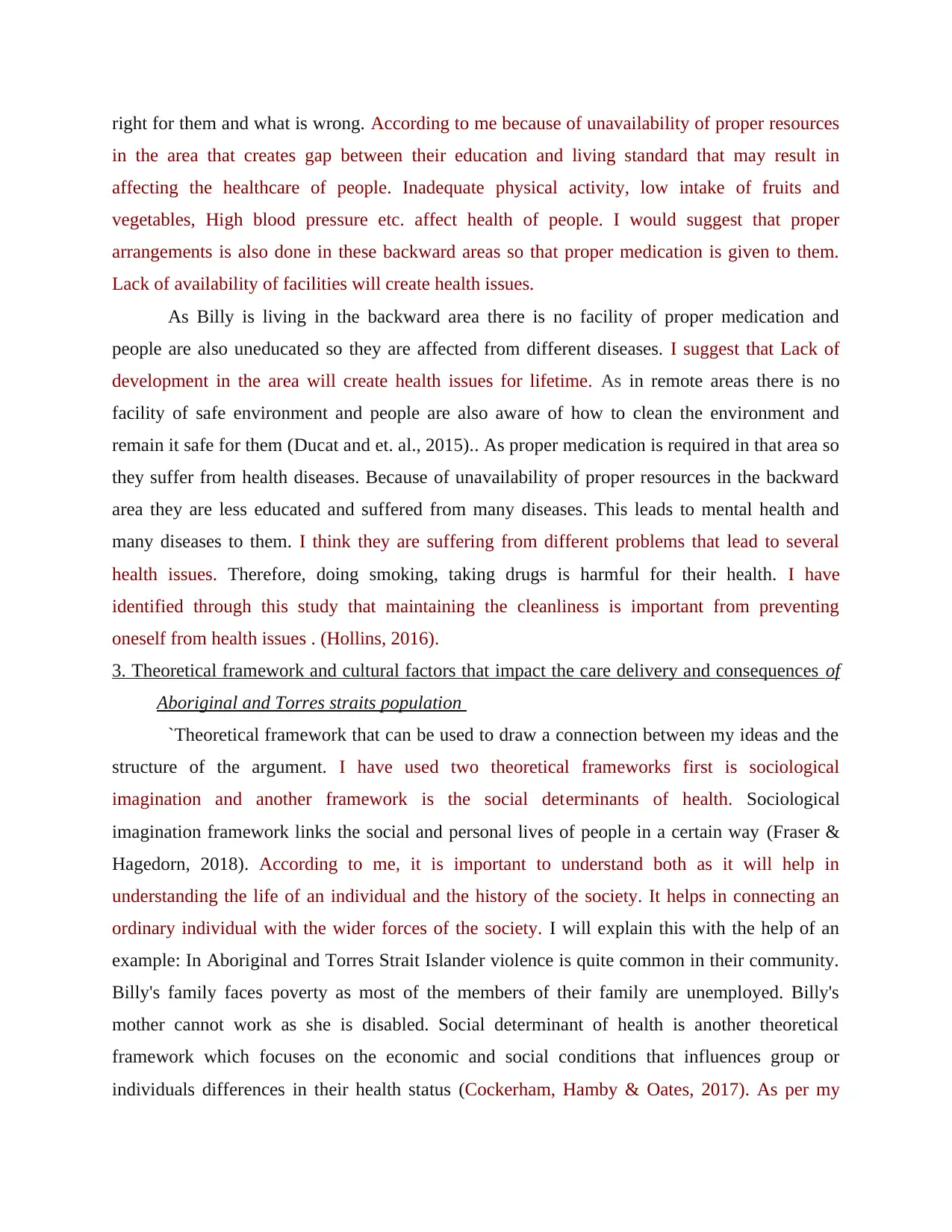
right for them and what is wrong. According to me because of unavailability of proper resources
in the area that creates gap between their education and living standard that may result in
affecting the healthcare of people. Inadequate physical activity, low intake of fruits and
vegetables, High blood pressure etc. affect health of people. I would suggest that proper
arrangements is also done in these backward areas so that proper medication is given to them.
Lack of availability of facilities will create health issues.
As Billy is living in the backward area there is no facility of proper medication and
people are also uneducated so they are affected from different diseases. I suggest that Lack of
development in the area will create health issues for lifetime. As in remote areas there is no
facility of safe environment and people are also aware of how to clean the environment and
remain it safe for them (Ducat and et. al., 2015).. As proper medication is required in that area so
they suffer from health diseases. Because of unavailability of proper resources in the backward
area they are less educated and suffered from many diseases. This leads to mental health and
many diseases to them. I think they are suffering from different problems that lead to several
health issues. Therefore, doing smoking, taking drugs is harmful for their health. I have
identified through this study that maintaining the cleanliness is important from preventing
oneself from health issues . (Hollins, 2016).
3. Theoretical framework and cultural factors that impact the care delivery and consequences of
Aboriginal and Torres straits population
`Theoretical framework that can be used to draw a connection between my ideas and the
structure of the argument. I have used two theoretical frameworks first is sociological
imagination and another framework is the social determinants of health. Sociological
imagination framework links the social and personal lives of people in a certain way (Fraser &
Hagedorn, 2018). According to me, it is important to understand both as it will help in
understanding the life of an individual and the history of the society. It helps in connecting an
ordinary individual with the wider forces of the society. I will explain this with the help of an
example: In Aboriginal and Torres Strait Islander violence is quite common in their community.
Billy's family faces poverty as most of the members of their family are unemployed. Billy's
mother cannot work as she is disabled. Social determinant of health is another theoretical
framework which focuses on the economic and social conditions that influences group or
individuals differences in their health status (Cockerham, Hamby & Oates, 2017). As per my
in the area that creates gap between their education and living standard that may result in
affecting the healthcare of people. Inadequate physical activity, low intake of fruits and
vegetables, High blood pressure etc. affect health of people. I would suggest that proper
arrangements is also done in these backward areas so that proper medication is given to them.
Lack of availability of facilities will create health issues.
As Billy is living in the backward area there is no facility of proper medication and
people are also uneducated so they are affected from different diseases. I suggest that Lack of
development in the area will create health issues for lifetime. As in remote areas there is no
facility of safe environment and people are also aware of how to clean the environment and
remain it safe for them (Ducat and et. al., 2015).. As proper medication is required in that area so
they suffer from health diseases. Because of unavailability of proper resources in the backward
area they are less educated and suffered from many diseases. This leads to mental health and
many diseases to them. I think they are suffering from different problems that lead to several
health issues. Therefore, doing smoking, taking drugs is harmful for their health. I have
identified through this study that maintaining the cleanliness is important from preventing
oneself from health issues . (Hollins, 2016).
3. Theoretical framework and cultural factors that impact the care delivery and consequences of
Aboriginal and Torres straits population
`Theoretical framework that can be used to draw a connection between my ideas and the
structure of the argument. I have used two theoretical frameworks first is sociological
imagination and another framework is the social determinants of health. Sociological
imagination framework links the social and personal lives of people in a certain way (Fraser &
Hagedorn, 2018). According to me, it is important to understand both as it will help in
understanding the life of an individual and the history of the society. It helps in connecting an
ordinary individual with the wider forces of the society. I will explain this with the help of an
example: In Aboriginal and Torres Strait Islander violence is quite common in their community.
Billy's family faces poverty as most of the members of their family are unemployed. Billy's
mother cannot work as she is disabled. Social determinant of health is another theoretical
framework which focuses on the economic and social conditions that influences group or
individuals differences in their health status (Cockerham, Hamby & Oates, 2017). As per my
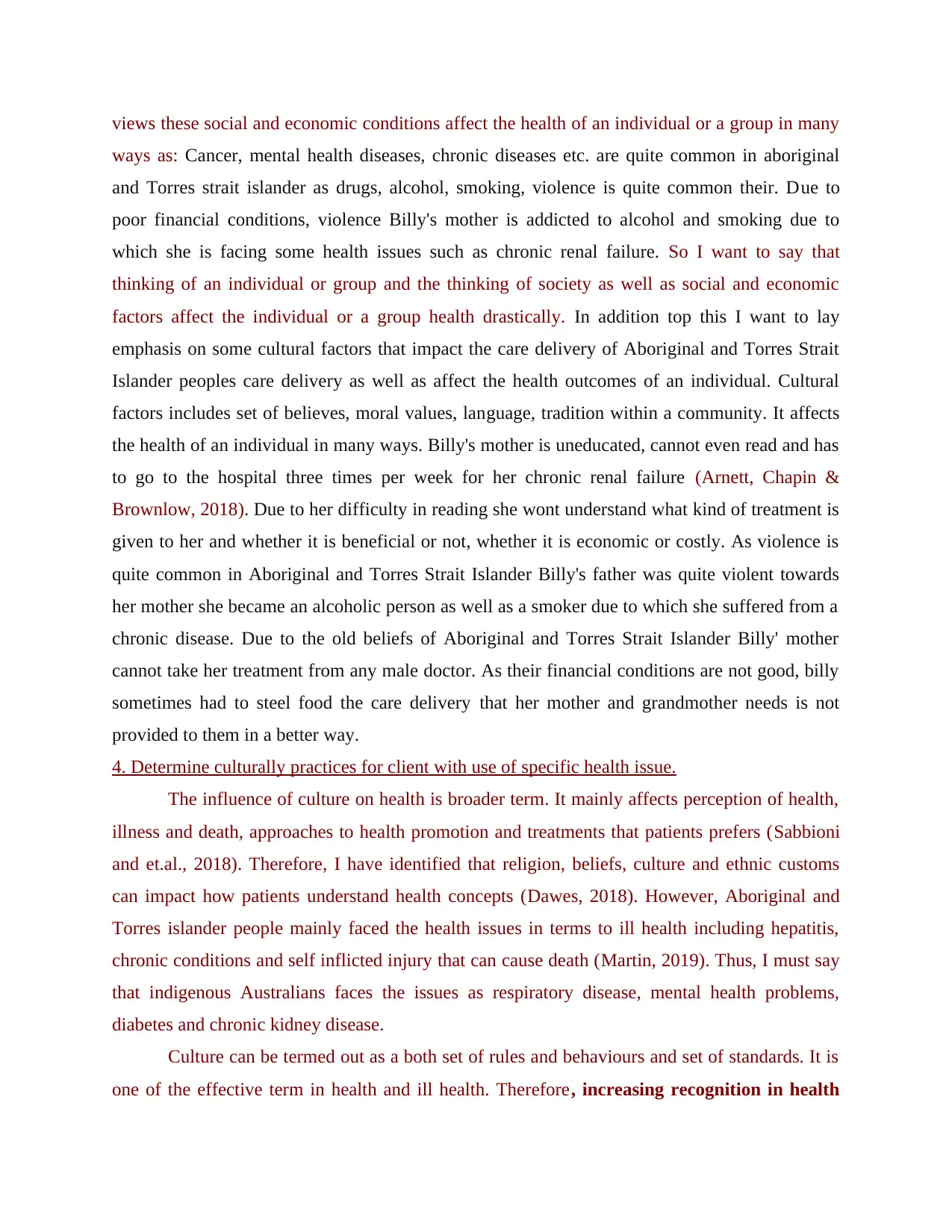
views these social and economic conditions affect the health of an individual or a group in many
ways as: Cancer, mental health diseases, chronic diseases etc. are quite common in aboriginal
and Torres strait islander as drugs, alcohol, smoking, violence is quite common their. Due to
poor financial conditions, violence Billy's mother is addicted to alcohol and smoking due to
which she is facing some health issues such as chronic renal failure. So I want to say that
thinking of an individual or group and the thinking of society as well as social and economic
factors affect the individual or a group health drastically. In addition top this I want to lay
emphasis on some cultural factors that impact the care delivery of Aboriginal and Torres Strait
Islander peoples care delivery as well as affect the health outcomes of an individual. Cultural
factors includes set of believes, moral values, language, tradition within a community. It affects
the health of an individual in many ways. Billy's mother is uneducated, cannot even read and has
to go to the hospital three times per week for her chronic renal failure (Arnett, Chapin &
Brownlow, 2018). Due to her difficulty in reading she wont understand what kind of treatment is
given to her and whether it is beneficial or not, whether it is economic or costly. As violence is
quite common in Aboriginal and Torres Strait Islander Billy's father was quite violent towards
her mother she became an alcoholic person as well as a smoker due to which she suffered from a
chronic disease. Due to the old beliefs of Aboriginal and Torres Strait Islander Billy' mother
cannot take her treatment from any male doctor. As their financial conditions are not good, billy
sometimes had to steel food the care delivery that her mother and grandmother needs is not
provided to them in a better way.
4. Determine culturally practices for client with use of specific health issue.
The influence of culture on health is broader term. It mainly affects perception of health,
illness and death, approaches to health promotion and treatments that patients prefers (Sabbioni
and et.al., 2018). Therefore, I have identified that religion, beliefs, culture and ethnic customs
can impact how patients understand health concepts (Dawes, 2018). However, Aboriginal and
Torres islander people mainly faced the health issues in terms to ill health including hepatitis,
chronic conditions and self inflicted injury that can cause death (Martin, 2019). Thus, I must say
that indigenous Australians faces the issues as respiratory disease, mental health problems,
diabetes and chronic kidney disease.
Culture can be termed out as a both set of rules and behaviours and set of standards. It is
one of the effective term in health and ill health. Therefore, increasing recognition in health
ways as: Cancer, mental health diseases, chronic diseases etc. are quite common in aboriginal
and Torres strait islander as drugs, alcohol, smoking, violence is quite common their. Due to
poor financial conditions, violence Billy's mother is addicted to alcohol and smoking due to
which she is facing some health issues such as chronic renal failure. So I want to say that
thinking of an individual or group and the thinking of society as well as social and economic
factors affect the individual or a group health drastically. In addition top this I want to lay
emphasis on some cultural factors that impact the care delivery of Aboriginal and Torres Strait
Islander peoples care delivery as well as affect the health outcomes of an individual. Cultural
factors includes set of believes, moral values, language, tradition within a community. It affects
the health of an individual in many ways. Billy's mother is uneducated, cannot even read and has
to go to the hospital three times per week for her chronic renal failure (Arnett, Chapin &
Brownlow, 2018). Due to her difficulty in reading she wont understand what kind of treatment is
given to her and whether it is beneficial or not, whether it is economic or costly. As violence is
quite common in Aboriginal and Torres Strait Islander Billy's father was quite violent towards
her mother she became an alcoholic person as well as a smoker due to which she suffered from a
chronic disease. Due to the old beliefs of Aboriginal and Torres Strait Islander Billy' mother
cannot take her treatment from any male doctor. As their financial conditions are not good, billy
sometimes had to steel food the care delivery that her mother and grandmother needs is not
provided to them in a better way.
4. Determine culturally practices for client with use of specific health issue.
The influence of culture on health is broader term. It mainly affects perception of health,
illness and death, approaches to health promotion and treatments that patients prefers (Sabbioni
and et.al., 2018). Therefore, I have identified that religion, beliefs, culture and ethnic customs
can impact how patients understand health concepts (Dawes, 2018). However, Aboriginal and
Torres islander people mainly faced the health issues in terms to ill health including hepatitis,
chronic conditions and self inflicted injury that can cause death (Martin, 2019). Thus, I must say
that indigenous Australians faces the issues as respiratory disease, mental health problems,
diabetes and chronic kidney disease.
Culture can be termed out as a both set of rules and behaviours and set of standards. It is
one of the effective term in health and ill health. Therefore, increasing recognition in health
⊘ This is a preview!⊘
Do you want full access?
Subscribe today to unlock all pages.

Trusted by 1+ million students worldwide
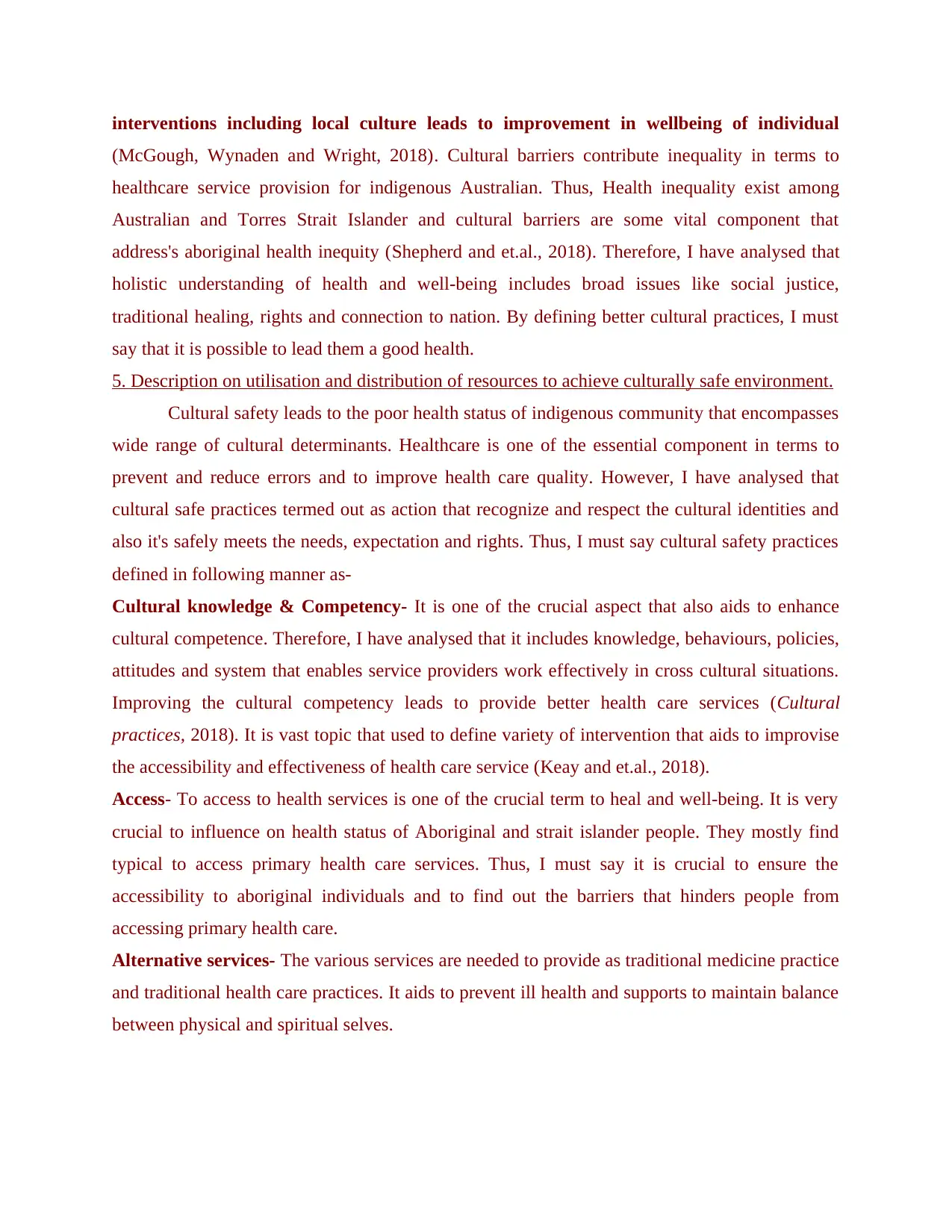
interventions including local culture leads to improvement in wellbeing of individual
(McGough, Wynaden and Wright, 2018). Cultural barriers contribute inequality in terms to
healthcare service provision for indigenous Australian. Thus, Health inequality exist among
Australian and Torres Strait Islander and cultural barriers are some vital component that
address's aboriginal health inequity (Shepherd and et.al., 2018). Therefore, I have analysed that
holistic understanding of health and well-being includes broad issues like social justice,
traditional healing, rights and connection to nation. By defining better cultural practices, I must
say that it is possible to lead them a good health.
5. Description on utilisation and distribution of resources to achieve culturally safe environment.
Cultural safety leads to the poor health status of indigenous community that encompasses
wide range of cultural determinants. Healthcare is one of the essential component in terms to
prevent and reduce errors and to improve health care quality. However, I have analysed that
cultural safe practices termed out as action that recognize and respect the cultural identities and
also it's safely meets the needs, expectation and rights. Thus, I must say cultural safety practices
defined in following manner as-
Cultural knowledge & Competency- It is one of the crucial aspect that also aids to enhance
cultural competence. Therefore, I have analysed that it includes knowledge, behaviours, policies,
attitudes and system that enables service providers work effectively in cross cultural situations.
Improving the cultural competency leads to provide better health care services (Cultural
practices, 2018). It is vast topic that used to define variety of intervention that aids to improvise
the accessibility and effectiveness of health care service (Keay and et.al., 2018).
Access- To access to health services is one of the crucial term to heal and well-being. It is very
crucial to influence on health status of Aboriginal and strait islander people. They mostly find
typical to access primary health care services. Thus, I must say it is crucial to ensure the
accessibility to aboriginal individuals and to find out the barriers that hinders people from
accessing primary health care.
Alternative services- The various services are needed to provide as traditional medicine practice
and traditional health care practices. It aids to prevent ill health and supports to maintain balance
between physical and spiritual selves.
(McGough, Wynaden and Wright, 2018). Cultural barriers contribute inequality in terms to
healthcare service provision for indigenous Australian. Thus, Health inequality exist among
Australian and Torres Strait Islander and cultural barriers are some vital component that
address's aboriginal health inequity (Shepherd and et.al., 2018). Therefore, I have analysed that
holistic understanding of health and well-being includes broad issues like social justice,
traditional healing, rights and connection to nation. By defining better cultural practices, I must
say that it is possible to lead them a good health.
5. Description on utilisation and distribution of resources to achieve culturally safe environment.
Cultural safety leads to the poor health status of indigenous community that encompasses
wide range of cultural determinants. Healthcare is one of the essential component in terms to
prevent and reduce errors and to improve health care quality. However, I have analysed that
cultural safe practices termed out as action that recognize and respect the cultural identities and
also it's safely meets the needs, expectation and rights. Thus, I must say cultural safety practices
defined in following manner as-
Cultural knowledge & Competency- It is one of the crucial aspect that also aids to enhance
cultural competence. Therefore, I have analysed that it includes knowledge, behaviours, policies,
attitudes and system that enables service providers work effectively in cross cultural situations.
Improving the cultural competency leads to provide better health care services (Cultural
practices, 2018). It is vast topic that used to define variety of intervention that aids to improvise
the accessibility and effectiveness of health care service (Keay and et.al., 2018).
Access- To access to health services is one of the crucial term to heal and well-being. It is very
crucial to influence on health status of Aboriginal and strait islander people. They mostly find
typical to access primary health care services. Thus, I must say it is crucial to ensure the
accessibility to aboriginal individuals and to find out the barriers that hinders people from
accessing primary health care.
Alternative services- The various services are needed to provide as traditional medicine practice
and traditional health care practices. It aids to prevent ill health and supports to maintain balance
between physical and spiritual selves.
Paraphrase This Document
Need a fresh take? Get an instant paraphrase of this document with our AI Paraphraser
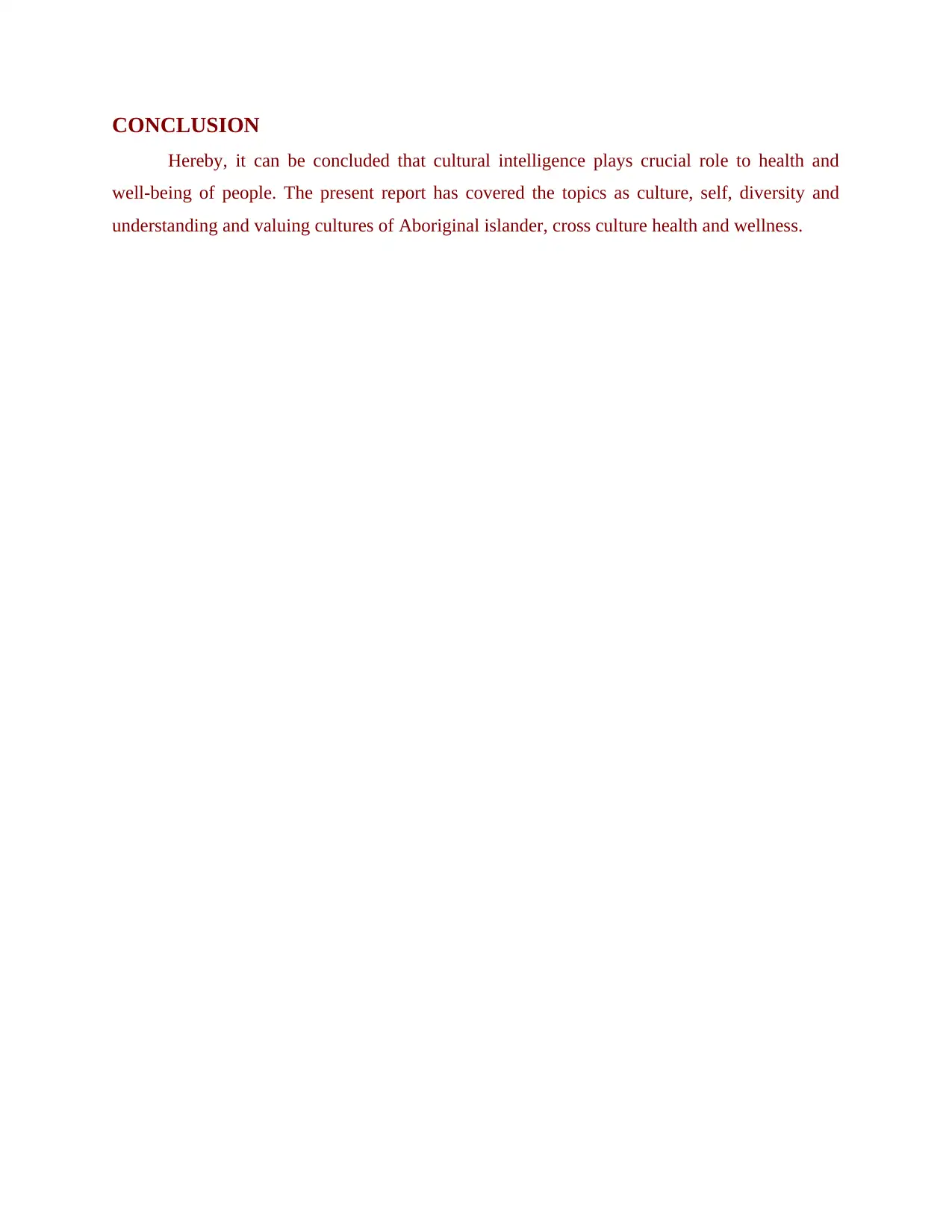
CONCLUSION
Hereby, it can be concluded that cultural intelligence plays crucial role to health and
well-being of people. The present report has covered the topics as culture, self, diversity and
understanding and valuing cultures of Aboriginal islander, cross culture health and wellness.
Hereby, it can be concluded that cultural intelligence plays crucial role to health and
well-being of people. The present report has covered the topics as culture, self, diversity and
understanding and valuing cultures of Aboriginal islander, cross culture health and wellness.
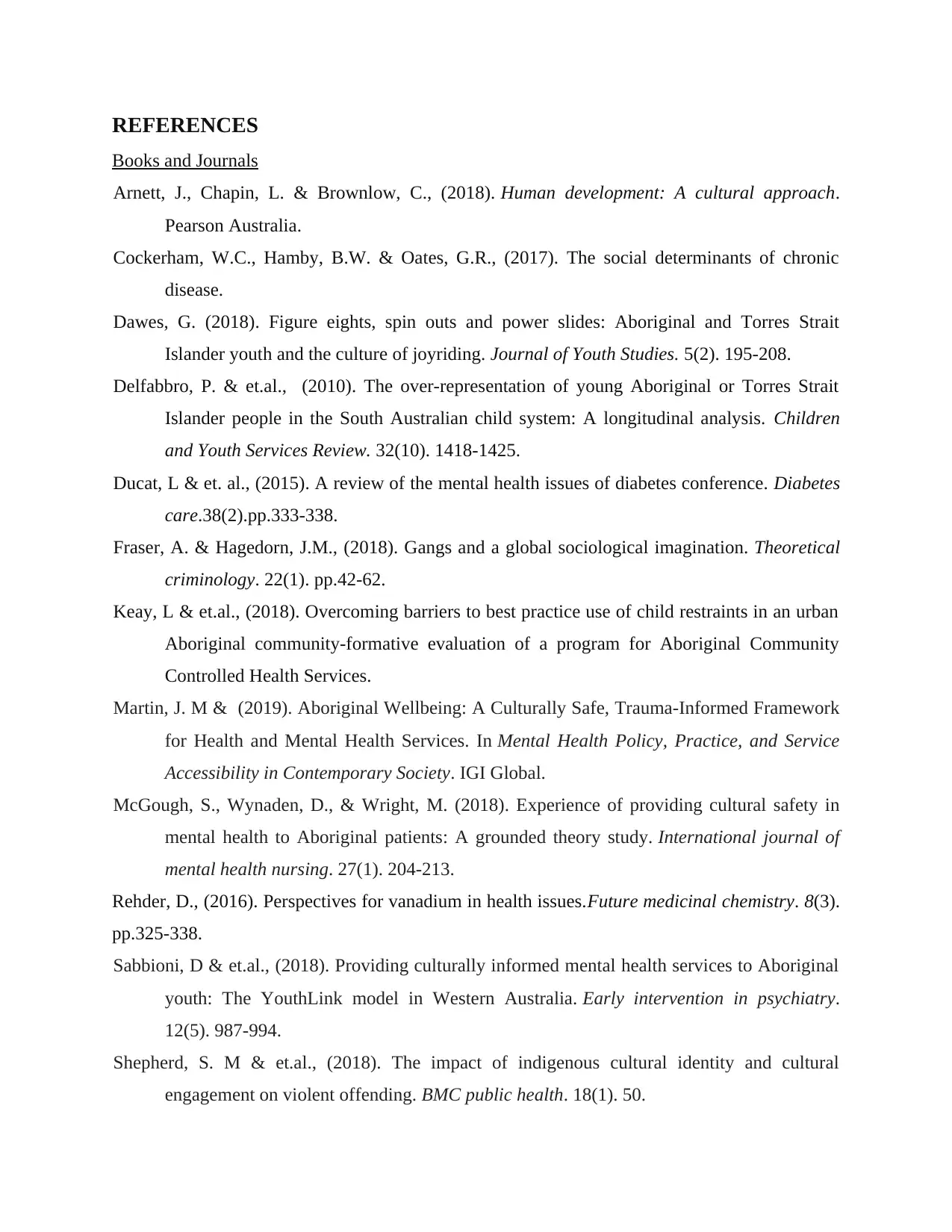
REFERENCES
Books and Journals
Arnett, J., Chapin, L. & Brownlow, C., (2018). Human development: A cultural approach.
Pearson Australia.
Cockerham, W.C., Hamby, B.W. & Oates, G.R., (2017). The social determinants of chronic
disease.
Dawes, G. (2018). Figure eights, spin outs and power slides: Aboriginal and Torres Strait
Islander youth and the culture of joyriding. Journal of Youth Studies. 5(2). 195-208.
Delfabbro, P. & et.al., (2010). The over-representation of young Aboriginal or Torres Strait
Islander people in the South Australian child system: A longitudinal analysis. Children
and Youth Services Review. 32(10). 1418-1425.
Ducat, L & et. al., (2015). A review of the mental health issues of diabetes conference. Diabetes
care.38(2).pp.333-338.
Fraser, A. & Hagedorn, J.M., (2018). Gangs and a global sociological imagination. Theoretical
criminology. 22(1). pp.42-62.
Keay, L & et.al., (2018). Overcoming barriers to best practice use of child restraints in an urban
Aboriginal community-formative evaluation of a program for Aboriginal Community
Controlled Health Services.
Martin, J. M & (2019). Aboriginal Wellbeing: A Culturally Safe, Trauma-Informed Framework
for Health and Mental Health Services. In Mental Health Policy, Practice, and Service
Accessibility in Contemporary Society. IGI Global.
McGough, S., Wynaden, D., & Wright, M. (2018). Experience of providing cultural safety in
mental health to Aboriginal patients: A grounded theory study. International journal of
mental health nursing. 27(1). 204-213.
Rehder, D., (2016). Perspectives for vanadium in health issues.Future medicinal chemistry. 8(3).
pp.325-338.
Sabbioni, D & et.al., (2018). Providing culturally informed mental health services to Aboriginal
youth: The YouthLink model in Western Australia. Early intervention in psychiatry.
12(5). 987-994.
Shepherd, S. M & et.al., (2018). The impact of indigenous cultural identity and cultural
engagement on violent offending. BMC public health. 18(1). 50.
Books and Journals
Arnett, J., Chapin, L. & Brownlow, C., (2018). Human development: A cultural approach.
Pearson Australia.
Cockerham, W.C., Hamby, B.W. & Oates, G.R., (2017). The social determinants of chronic
disease.
Dawes, G. (2018). Figure eights, spin outs and power slides: Aboriginal and Torres Strait
Islander youth and the culture of joyriding. Journal of Youth Studies. 5(2). 195-208.
Delfabbro, P. & et.al., (2010). The over-representation of young Aboriginal or Torres Strait
Islander people in the South Australian child system: A longitudinal analysis. Children
and Youth Services Review. 32(10). 1418-1425.
Ducat, L & et. al., (2015). A review of the mental health issues of diabetes conference. Diabetes
care.38(2).pp.333-338.
Fraser, A. & Hagedorn, J.M., (2018). Gangs and a global sociological imagination. Theoretical
criminology. 22(1). pp.42-62.
Keay, L & et.al., (2018). Overcoming barriers to best practice use of child restraints in an urban
Aboriginal community-formative evaluation of a program for Aboriginal Community
Controlled Health Services.
Martin, J. M & (2019). Aboriginal Wellbeing: A Culturally Safe, Trauma-Informed Framework
for Health and Mental Health Services. In Mental Health Policy, Practice, and Service
Accessibility in Contemporary Society. IGI Global.
McGough, S., Wynaden, D., & Wright, M. (2018). Experience of providing cultural safety in
mental health to Aboriginal patients: A grounded theory study. International journal of
mental health nursing. 27(1). 204-213.
Rehder, D., (2016). Perspectives for vanadium in health issues.Future medicinal chemistry. 8(3).
pp.325-338.
Sabbioni, D & et.al., (2018). Providing culturally informed mental health services to Aboriginal
youth: The YouthLink model in Western Australia. Early intervention in psychiatry.
12(5). 987-994.
Shepherd, S. M & et.al., (2018). The impact of indigenous cultural identity and cultural
engagement on violent offending. BMC public health. 18(1). 50.
⊘ This is a preview!⊘
Do you want full access?
Subscribe today to unlock all pages.

Trusted by 1+ million students worldwide
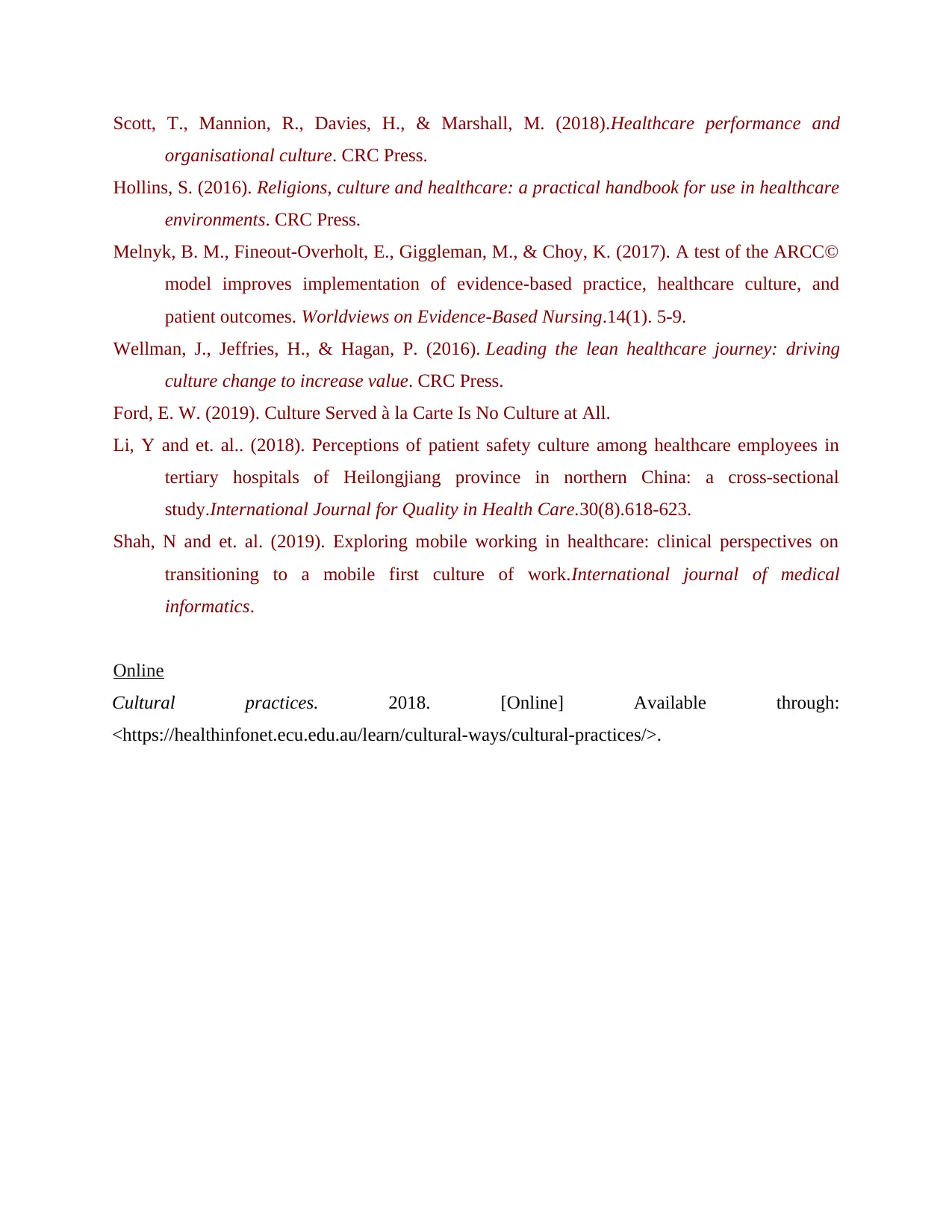
Scott, T., Mannion, R., Davies, H., & Marshall, M. (2018).Healthcare performance and
organisational culture. CRC Press.
Hollins, S. (2016). Religions, culture and healthcare: a practical handbook for use in healthcare
environments. CRC Press.
Melnyk, B. M., Fineout‐Overholt, E., Giggleman, M., & Choy, K. (2017). A test of the ARCC©
model improves implementation of evidence‐based practice, healthcare culture, and
patient outcomes. Worldviews on Evidence‐Based Nursing.14(1). 5-9.
Wellman, J., Jeffries, H., & Hagan, P. (2016). Leading the lean healthcare journey: driving
culture change to increase value. CRC Press.
Ford, E. W. (2019). Culture Served à la Carte Is No Culture at All.
Li, Y and et. al.. (2018). Perceptions of patient safety culture among healthcare employees in
tertiary hospitals of Heilongjiang province in northern China: a cross-sectional
study.International Journal for Quality in Health Care.30(8).618-623.
Shah, N and et. al. (2019). Exploring mobile working in healthcare: clinical perspectives on
transitioning to a mobile first culture of work.International journal of medical
informatics.
Online
Cultural practices. 2018. [Online] Available through:
<https://healthinfonet.ecu.edu.au/learn/cultural-ways/cultural-practices/>.
organisational culture. CRC Press.
Hollins, S. (2016). Religions, culture and healthcare: a practical handbook for use in healthcare
environments. CRC Press.
Melnyk, B. M., Fineout‐Overholt, E., Giggleman, M., & Choy, K. (2017). A test of the ARCC©
model improves implementation of evidence‐based practice, healthcare culture, and
patient outcomes. Worldviews on Evidence‐Based Nursing.14(1). 5-9.
Wellman, J., Jeffries, H., & Hagan, P. (2016). Leading the lean healthcare journey: driving
culture change to increase value. CRC Press.
Ford, E. W. (2019). Culture Served à la Carte Is No Culture at All.
Li, Y and et. al.. (2018). Perceptions of patient safety culture among healthcare employees in
tertiary hospitals of Heilongjiang province in northern China: a cross-sectional
study.International Journal for Quality in Health Care.30(8).618-623.
Shah, N and et. al. (2019). Exploring mobile working in healthcare: clinical perspectives on
transitioning to a mobile first culture of work.International journal of medical
informatics.
Online
Cultural practices. 2018. [Online] Available through:
<https://healthinfonet.ecu.edu.au/learn/cultural-ways/cultural-practices/>.
1 out of 10
Related Documents
Your All-in-One AI-Powered Toolkit for Academic Success.
+13062052269
info@desklib.com
Available 24*7 on WhatsApp / Email
![[object Object]](/_next/static/media/star-bottom.7253800d.svg)
Unlock your academic potential
Copyright © 2020–2026 A2Z Services. All Rights Reserved. Developed and managed by ZUCOL.




